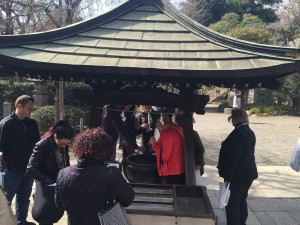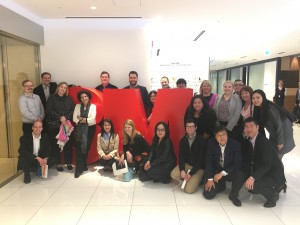Nineteen Mitchell Hamline School of Law students, led by Professor Ken Port, have spent their spring break in Japan.
The trip is part of Mitchell Hamline’s Japanese Law course. It gives students an up-close look at concepts they studied in class: criminal law in Japan, the Japanese Constitution, and what it takes to become a lawyer in Japan.
Port says the trip has been educational, informative, and fun.
“These students have learned a lot by being here,” he said. “They’ve seen Japanese order and structure, they’ve seen Japanese crowds and chaos, and most importantly they’ve experienced Japanese people, food, and nightlife.”
Port, along with Mitchell Hamline’s assistant dean and director of the Office of Multicultural and International Inclusion, Luiza Dreasher, have accompanied students on visits to 3M, St. Jude Medical, the U.S. Embassy, the Japanese Supreme Court, Tokyo District court, law firms, and many other sites.
“When I teach this class in St. Paul, I have to describe Japan,” Port said. “With students coming to Japan, they see firsthand how the things we studied are actually implemented.”
The trip has given 3L Alex Beeby a deeper appreciation for the role culture plays in both Japanese and American legal systems.
“Seeing the interaction of culture and law in Japan has compelled a reflection of that interaction in American jurisprudence,” he said.
Second-year Mitchell Hamline student Alissa Harrington described the trip as “surreal and thought-provoking” as well as invaluable in her understanding of the legal system in Japan.
“Instead of theorizing how a Japanese court would handle a highly stigmatized crime, we were in the courtroom watching it happen with legal professionals to provide context and translation,” she said. “We got to see that some things, like the disapproving glare of a judge, transcend language and cultures.”
Harrington is confident the weeklong trip to Japan will come in handy when she’s ready to enter the workforce.
“I know I can take the advice and skills used on the trip back home to Minnesota,” she said. “The legal field continues to demand more cross-border work and understanding, and I feel better prepared to work with people from any country.”



